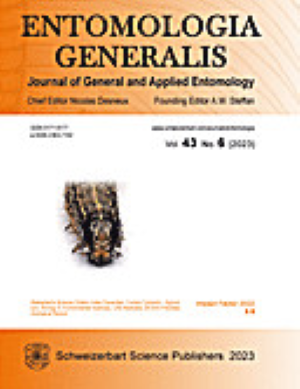节肢动物捕食者的生态位变异与动物群内的负向相互作用有关
IF 4.6
1区 农林科学
Q1 ENTOMOLOGY
引用次数: 0
摘要
生态位变异假说认为,种群生态位宽度会随着个体间对猎物利用率差异的增加而扩大(即个体食物专一化)。形成这种关系的主要生态驱动因素包括:a)生态机会;b)食物限制和剥削性竞争;c)种群内干扰。只有有限的实证研究检验了这些驱动因素对生态位变异-宽度关系的影响,而且只集中于脊椎动物。利用分子肠道内容分析法,我们研究了猎物多样性(代表生态机会)、猎物丰度(代表剥削性竞争/食物限制)和行会成员活动密度(代表行会内干扰)如何影响 13 种食肉甲虫和蜘蛛局部群落的短期个体食物专一性,进而影响种群生态位宽度。这项研究于 2011 年在瑞典的 10 块春大麦田中进行。我们发现,捕食者群落中物种的生态位变异以及平均种群生态位宽度随猎物丰度而降低,但随同业公会成员的活动密度而增加。结果表明,同类间的干扰和剥削性竞争/食物限制增加了食谱的变化。饮食差异的增加导致了观察到的种群饮食扩大。我们的研究结果支持生态位变异假说,并与传统观点相反,表明同业公会内的负面相互作用可能是一种多样化力量。本文章由计算机程序翻译,如有差异,请以英文原文为准。
Negative intraguild interactions drive niche variation in arthropod predators
The niche variation hypothesis states that the population niche width expands with increasing interindividual differences in prey utilization (i.e., individual dietary specialization). The main ecological drivers forming this relationship include a) ecological opportunity, b) food limitation and exploitative competition, and c) intraguild interference. Only a limited number of empirical studies have tested the impact of these drivers on the niche variation–width relationship and focused only on vertebrates. Using molecular gut content analysis, we investigated how prey diversity (proxy for ecological opportunity), prey abundance (proxy for exploitative competition / food-limitation), and activity density of guild members (proxy for intraguild interference) affect the short-term individual dietary specialization and consequently the population niche width in local communities of 13 species of predatory beetles and spiders. The study took place in 10 spring barley fields in Sweden in 2011. We found that the niche variation and consequently the average population niche width of the species in the predator community decreased with prey abundance but increased with activity density of guild members. The results indicate that intraguild interference and exploitative competition / food limitation increased dietary variation. The increased diet variation led to the observed population diet expansion. Our results support the niche variation hypothesis and, in contrast to the traditional view, show that negative intraguild interactions may act as a diversifying force.
求助全文
通过发布文献求助,成功后即可免费获取论文全文。
去求助
来源期刊

Entomologia Generalis
生物-昆虫学
CiteScore
7.10
自引率
18.80%
发文量
72
审稿时长
>12 weeks
期刊介绍:
Its scope covers all aspects of basic and applied research dealing with insects and more broadly with arthropods inhabiting wild, agricultural and/or urban habitats. The journal also considers research integrating various disciplines and issues within the broad field of entomology and ecology.
Entomologia Generalis publishes high quality research articles on advances in knowledge on the ecology and biology of arthropods, as well as on their importance for key ecosystems services, e.g. as biological control and pollination. The journal devotes special attention to contributions providing significant advances (i) on the fundamental knowledge and on sustainable control strategies of arthropod pests (including of stored products) and vectors of diseases, (ii) on the biology and ecology of beneficial arthropods, (iii) on the spread and impact of invasive pests, and (iv) on potential side effects of pest management methods.
Entomologia Generalis welcomes review articles on significant developments in the field of entomology. These are usually invited by the editorial board, but proposals may be sent to the Editor-in-Chief for preliminary assessment by the editorial board before formal submission to the journal. The journal also considers comments on papers published in Entomologia Generalis, as well as short notes on topics that are of broader interest.
 求助内容:
求助内容: 应助结果提醒方式:
应助结果提醒方式:


